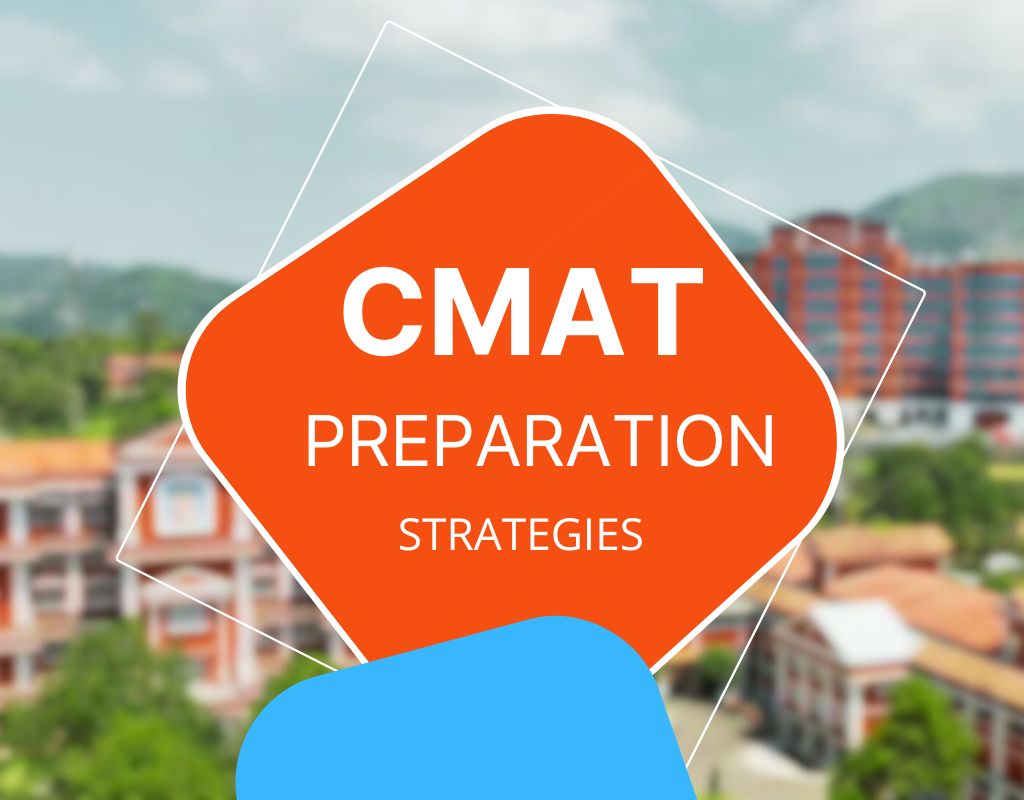
CMAT Exam
Common Management Admission Test is a national level online aptitude test organised by the National Testing Agency (NTA) for the admission into MBA/PGDM courses across the B-schools in India. Till 2018 it was conducted by All India Council for Technical Education every year as per the guidelines of Ministry of Human Resources Development (MHRD), Government of India. The assessment duration is three hours with 100 questions from the sections like Quantitative Ability and Data interpretation, Language Comprehension, Logical Reasoning and General Awareness. The total marks will be out of 400 conducted in a single session. The aspirants must have completed the graduation or equivalent from a recognized university. The Final year graduation student can also apply for the exam and they must submit the passing certificate at the time of joining for the course.
The test enables the institutions to select the best students for the management programs. The CMAT score is accepted by all AICTE-Approved universities/ affiliated colleges in India.
CMAT Exam Highlights
| Features | Details |
| Exam Name | Common Management Admission Test |
| Organising Body | National Testing Agency (NTA) |
| Exam Level | National |
| Exam Frequency | Once a year |
| Exam Mode | Online |
| Exam duration | 3 Hours |
|
Exam Syllabus |
· Quantitative Ability and Data interpretation
· Language Comprehension & Verbal Ability · Logical Reasoning · General Awareness |
| Language | English |
| Exam Pattern | 100 Question in MCQ format |
| Exam Fee | Rs 1600 (General-Male)
Rs 1000 (General-Female) Rs 800 (SC, ST, PWD-Male) Rs 700 (SC, ST, PWD- Female)
|
| Courses Offered | MBA/PGDM |
| No. of Test Cities | 75 |
| Exam Helpdesk No. | 0120-6895200 |
| Exam Website | http://www.nta.ac.in |
CMAT Syllabus
The CMAT syllabus is like the CAT exam syllabus take in all the four section like quantitative technique & data interpretation, Logical Reasoning and Language comprehension and General Awareness. It is important to learn all the topic in this section. The CMAT question paper consist of 100 questions. For each right answer four marks will be awarded and for each wrong answer there will be deduction of one mark. The pattern of the exam for this year won’t be any change. The section wise topics will be given in detail below.
Quantitative Technique and Data Interpretation
This section has 25 questions in MCQ format. The important topics are discussed below:
| Tabulation | Partnership | Profit and Loss |
| Pipes and Cistern | Simple Interest and Compound Interest | Geometry |
| Probability | Allegation & Mixture | Time -Speed-Distance |
| Permutation & Combination | Percentage | Work and Time |
| In-equation | Quadratic and Linear Equation | Mensuration |
| Algebra | Graph | Pie Chart & Bar Chart |
| Ration and Proportion | Line | Number System |
Logical Reasoning
The logical reasoning provides 25 MCQ’s. The basic formulas and concepts needed to be practised since most of the questions are based on logics. The important topic to be covered include:
| Analogy Test | Coding and Decoding | Direction and Distance Test |
| Linear Arrangement | Blood Relationship Tests | Statement Assumptions |
| Statement and Arguments | Analytical Reasoning | Ranking Tests |
| Sequencing | Inferences | Statement and Conclusions |
| Matrix Arrangement | Non-Verbal Reasoning | Venn Diagram |
| Number Series | Cause and Effects | Symbol Based Problems |
Language Comprehension
These sections have two parts the Verbal Ability and Reading Comprehension these two parts together contribute 25 question. The important topic to be practised in the Language section is discussed in detail below:
| Synonyms | Reading Comprehension | English Usage Errors |
| Antonyms | Paragraph Completion | English Grammar |
| Phrases | One-word Substitution | Sentence Correction |
| Sentence Improvement | Idioms | Jumbled Para |
General Awareness
The general awareness section has 25 MCQ questions which will be from both current affair and static GK. This portion will cover the following topics:
| Literature | Sports News | Science in Everyday Life |
| Politics | Geography | Indian Constitutions |
| Trade Awareness | History | Current Affairs of National and International Economy |
| Economics | Culture | Personalities in News |
BEST BOOKS FOR CMAT EXAM PREPARATIONS
The books for preparation of CMAT Exam is very much similar to each other as their syllabus are also similar. The following are the highly recommended books for the CMAT preparation. This will help us to choose most beneficial book from the market.
Best Book for Quantitative Aptitude
| Book Name | Authors/Publishers Name |
| How to Prepare for Quantitative Aptitude for CAT | Arun Sharma (McGraw Hill Education) |
| Quantitative Aptitude Quantum CAT Common Admission Tests for Admission into IIMs | Sarvesh K Verma (Arihant) |
| Quantitative Aptitude for Competitive Examination | Abhijit Guha (McGraw Hill Education) |
| NCERT Mathematics Books for Standard 8, 9, and 10 | NCERT |
| Quantitative Aptitude | Dr RS Aggarwal |
Best Book for Logical Reasoning
| Books | Author/ Publisher name |
| How to Prepare for Logical Reasoning for the CAT | Arun Sharma (McGraw Education) |
| Logical Reasoning and Data Interpretation for the CAT | Nishit K Sinha (Pearson) |
Best Books for Language Comprehension
| Book Name | Authors/Publishers Name |
| How to Prepare for Verbal Ability and Reading Comprehension for the CAT | Arun Sharma (McGraw Education) |
| The Pearson Guide to Verbal Ability and Logical Reasoning for the CAT | Nishit K Sinha (Pearson) |
| A Modern Approach to Verbal & Non-verbal Reasoning | Dr RS Aggarwal |
| Trishna’s Verbal Ability and Logical Reasoning for the CAT and Other MBA Examinations | TIME |
Along with these books the books by SK Sinha, S Satyanarayan and JS Rana’s “The Complete Reference Manual for CMAT” is an exclusive book for CMAT preparation. And some other books that can be really helpful for the preparations are also given below”
- A Communicative Grammar of English by Geoffrey Leech and Jan Svartvik
- 30 Days to a More Powerful Vocabulary by Norman Lewis
- The Students’ Companion by Wilfred D Best
- Word Power Made Easy by Norman Lewis
- Business English and Communication by John O E Clark
- Wren & Martin English Grammar
Best Book for General Awareness
Reading Journal and newspaper can help a lot in developing the General Knowledge and Static GK. The listed below newspapers and journals can help lot in preparing this section.
| Newspapers and Journals | |
| The Hindu | Wall Street Journal |
| Economic Times | Business Today |
| Hindu Business Line | Management Compass Career Launcher |
| Business World | The Financial Times |
| Competition Success Review | Financial Express |
CMAT PREPARATION STRATEGY AND TIPS TO SUCCEDD
STEP 1: Learn the CMAT Exam Pattern and Syllabus: For succeeding any ventures one need to thoroughly understand where to begin. The base essential for the further development so while preparing for the CMAT exam one need to have knowledge about what to study? The syllabus should be carefully understood. The syllabus is clearly explained in the NTA official website so before starting the real preparation go through the syllabus and see where to begin. The syllabus is divided into four section I, e. Quantitative techniques, English Language and Reading Comprehension, Logical Reasoning, and General Awareness.
It is always preferrable to start with section that is tough for you. Learn from the basics and move to the advanced applications. It is better to move to the new section on completing the other. Try to avoid confusion by preparing for the multiple topics at a time. The table below shows the exam pattern of the CMAT Exam
| Pattern | Details |
| No. of Questions | 100 |
| No. of Sections | 4 |
| Questions in Each Section | 25 |
| Total Marks | 400 |
| Type of Questions | MCQ |
| Marking Pattern | +4 for Correct Answer & -1 for Wrong Answer |
| Difficulty Level | Moderate |
Step 2: Practice Through Sample Papers and Mock Test: Once the syllabus and the pattern are clearly understood start practicing Mock tests and sample papers. It will help to get familiarized with the question type. The National Testing Agency provides official mock test papers in their website. There are also several application providing free mock tests which include section wise tests so once after preparing the topic do mock tests to check the readiness. Avoid doing mock test without preparation as it can be demotivating complete the syllabus and then move on to solve sample papers.
Analyze the performance after completing every mock test which will help to see the weak and strong points so that we can spend more time for preparing those topics. Practicing mock paper will help to increase the speed and accuracy of the answering.
Step 3: Continuous Revision
Practise every topic covered in the section and do mock test to see if all the topics have learned thoroughly. So, few days before the exam the revision of all topics very significant give more time to prepare for the topic that need more attention and care. Avoid starting preparation for new topics prior to the exam revising the topics will be more helpful. Take rest day prior to the exam get freshen up. Preparing short note will help to revise the portion easily especially concepts, tricks, and tips.
Revision can help a lot to remember the concept and apply it without confusion. Avoid revising on the day of exam.
Tips to crack CMAT Exam
- Carefully plan and organise a study plan by allocating time and always stick to this plan. Allot time to topic based on the difficulty level to study.
- Solve a lot of mock test paper that will help to improve the speed and timing and familiarize with the question type. Do weekly at initial stage then do daily tests after preparing all the topics in the section.
- Try to cover more than one topic in one day spending time on a single topic can be boring so practise distributive learning by covering variety topic.
- The revision is the best way to score high percentage in the exam this will make our studies disciplined and help to increase accuracy and speed.
- Learn the basics which can give great strength. There is always a lot of basic questions asked in the exam learn this type of questions.
- Taking regular break in between the study time will help to rejuvenate. Shorter studying session with proper break will make us learn faster.
- Set a deadline to finish the preparation covering the whole topics in time give time for revision. Make goals that are possible to achieve.
Best MBA College in Kerala that accepts CMAT/KMAT/CAT Score for MBA Admission






